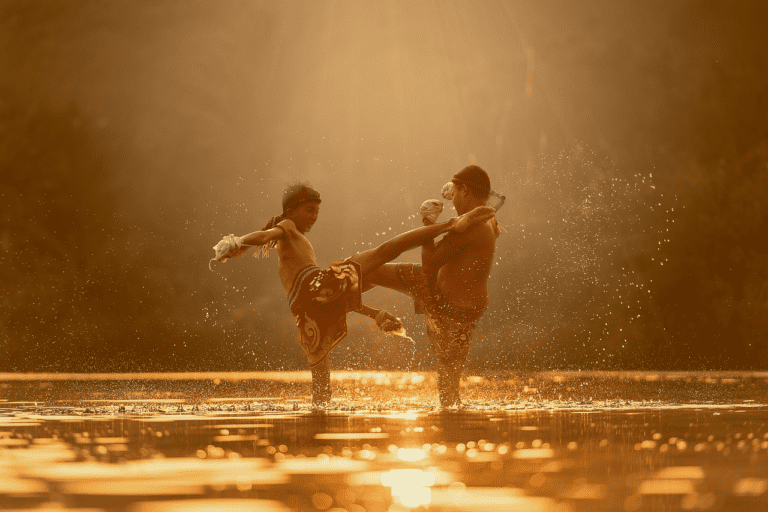Unpack Social Learning Theory – A Quick Guide
Welcome to our quick guide on Social Learning Theory! In this article, we will delve into the fascinating world of Social Learning Theory, proposed by the renowned psychologist Albert Bandura. If you’ve ever wondered how we learn from our environment and the people around us, then you’re in the right place. Social Learning Theory explores the cognitive factors involved in learning, emphasizing the role of observation, imitation, and modeling behavior.
One of the key concepts in Social Learning Theory is observational learning, where we learn by observing others and imitating their behavior. Bandura conducted the famous Bobo Doll experiment, where children observed and then imitated aggressive behavior towards a doll. This experiment highlighted the importance of modeling behavior and its impact on learning.
Throughout this guide, we will uncover the assumptions and mediating processes of Social Learning Theory, explore the influences on observational learning, and discuss its practical applications in various fields such as psychotherapy, education, and public health. So, let’s dive in and expand our understanding of Social Learning Theory!
Key Takeaways
- Social Learning Theory explores how cognitive factors are involved in learning.
- Observational learning plays a crucial role in Social Learning Theory, with individuals observing and imitating the behaviors of others.
- In Social Learning Theory, attention, retention, motor reproduction, and motivation are key mediational processes that determine whether imitation occurs.
- The famous Bobo Doll experiment conducted by Bandura demonstrated the power of modeling behavior in observational learning.
- Social Learning Theory has practical applications in psychotherapy, education, and public health, guiding interventions and strategies for behavior change.
What is Social Learning Theory?
Social Learning Theory serves as the ‘bridge’ between traditional behaviorism and the cognitive approach to learning. It delves into the role of cognitive factors in the learning process and emphasizes the significance of observing, modeling, and imitating the behaviors, attitudes, and emotional reactions of others. Unlike behaviorist approaches, Social Learning Theory, proposed by Albert Bandura, recognizes humans as active information processors who consciously consider the relationship between their behavior and its outcomes.
Assumptions of Social Learning Theory
Social Learning Theory explores the intricate interplay between environmental and cognitive factors that shape human learning and behavior. It emphasizes the significance of observing, modeling, and imitating the behaviors, attitudes, and emotional reactions of others. This theory aligns with behaviorist learning theories while incorporating the concepts of mediational processes and observational learning to enhance our understanding of how individuals acquire knowledge from their surroundings.
At its core, Social Learning Theory recognizes that people are not solely products of their environment but active learners who internalize and adapt observed behaviors. By observing others, individuals gain insight into the consequences of specific actions and develop cognitive representations that guide their behavior. This process involves four crucial mediational processes: attention, retention, motor reproduction, and motivation. The presence of these factors influences whether imitation will occur.
“Learning would be exceedingly laborious, not to mention hazardous, if people had to rely solely on the effects of their own actions to inform them what to do. Fortunately, most human behavior is learned observationally through modeling: from observing others one forms an idea of how new behaviors are performed, and on later occasions this coded information serves as a guide for action.”
– Albert Bandura
By integrating components of both behaviorism and cognitive psychology, Social Learning Theory provides a comprehensive framework that explains how individuals acquire new behaviors, perspectives, and skills through the process of observation and imitation. This perspective establishes the groundwork for understanding the complexities of social influence, underscores the importance of role models, and sheds light on the dynamic nature of human learning and adaptation.
| Assumptions | Description |
|---|---|
| Observation | Individuals acquire new behaviors by observing others. |
| Modeling | People imitate behaviors that they perceive as desirable or rewarding. |
| Imitation | Individuals replicate behaviors that they observe in others. |
| Behaviors | Learning occurs through the observation of others’ behaviors. |
| Attitudes | Individuals adopt attitudes and beliefs based on their observations. |
| Emotional Reactions | An individual’s emotional responses can be influenced by observing others’ reactions. |
Social Learning Theory posits that through observation, individuals construct their understanding of the world and adapt their behaviors accordingly. By grasping the assumptions of this theory, we gain valuable insights into the complex dynamics of human learning and behavior, and how observing others profoundly impacts our own development.
Mediating Processes in Social Learning Theory
Observational learning, a key aspect of Social Learning Theory, involves mediating processes that shape the learning experience. These mental factors play a crucial role in determining whether a new response is acquired and imitated. Let’s explore the essential mediating processes in Social Learning Theory:
Attention
Attention is a fundamental mediating process in observational learning. To learn from observation, you must pay attention to the behavior being demonstrated and its consequences. By focusing your attention, you form a mental representation of the behavior, which serves as a foundation for future imitation.
Retention
Retention refers to your ability to remember the observed behavior. After paying attention to the model and their actions, your capacity to retain the information is essential for later reproduction. The more effectively you retain the behavior in memory, the greater the likelihood of imitating it at a later time.
Motor Reproduction
Motor reproduction involves the ability to perform the behavior that the model has demonstrated. It requires the translation of observed actions into physical actions. By successfully reproducing the behavior, you reinforce your learning and strengthen the connection between observation and action.
Motivation
Motivation plays a significant role in observational learning. It influences the decision to imitate a behavior based on the perceived rewards or punishments associated with it. If the observed behavior is seen as beneficial or rewarding, your motivation to imitate it increases. Conversely, if the behavior leads to negative consequences, your motivation to imitate decreases.
Understanding and recognizing these mediational processes in social learning are vital for comprehending how individuals acquire new behaviors through observation. By paying attention, retaining information, reproducing actions, and evaluating motivation, you can actively engage in the learning process and shape your behavior accordingly.
What is Observational Learning?
Observational learning is a fundamental aspect of Social Learning Theory, which explores how individuals learn and adopt behaviors through observation. This type of learning occurs when people observe and encode the behaviors of models in their environment, and later imitate or copy those behaviors. It emphasizes the role of imitation and modeling behavior in acquiring new knowledge and skills.
In the field of psychology, observational learning is exemplified by the renowned Bobo Doll experiment conducted by Albert Bandura. In this experiment, children observed an adult model displaying aggressive behavior towards a Bobo Doll. Later, when given the opportunity, the children imitated the aggressive behavior they had witnessed.
This experiment demonstrated the power of observational learning and highlighted the importance of role models in shaping behavior. It revealed that individuals learn by observing others, especially those they perceive as influential or authoritative figures. Through observational learning, individuals acquire new behaviors, attitudes, and emotional reactions by witnessing and imitating the actions of others.
Observational learning is not limited to children; it is a process that continues throughout life. People observe and learn from their peers, family members, teachers, colleagues, and even media figures. By observing and modeling the behaviors of others, individuals can expand their repertoire of skills, acquire new knowledge, and adapt to various social situations.
Influences on Observational Learning
Observational learning is a complex process influenced by various factors. Understanding these influences can provide valuable insights into how behaviors are acquired and replicated. In this section, we explore several key factors that impact observational learning.
Attentional Processes
Attention plays a crucial role in observational learning. For learning to occur, observers must pay attention to the behavior they are observing. They need to find it worth imitating and focus their cognitive resources on understanding and processing the observed behavior. When attentional processes are engaged effectively, learners can construct mental representations of the behavior, facilitating future imitation.
Similarity of the Model
People are more likely to imitate behaviors of those they perceive as similar to themselves. Individuals tend to model their behavior after those who share similar characteristics, values, or beliefs. The perceived similarity between the observer and the model can enhance identification and increase the likelihood of imitation.
Identification
Identification occurs when individuals adopt the observed behaviors, values, beliefs, and attitudes of those they identify with. It involves a level of connection and alignment with the model, which can be influenced by factors such as shared interests, aspirations, or social status. The process of identification is a significant driver of observational learning.
Rewarded Behaviors
Rewards play a crucial role in observational learning. When observers witness behavior being rewarded or receive positive outcomes, they are more likely to imitate such behaviors. Rewards serve as incentives and reinforce the idea that imitating the behavior can lead to favorable outcomes or benefits.
Status of the Model
The status or perceived authority of the model can significantly influence the likelihood of imitation. Individuals are more likely to imitate behaviors exhibited by models they perceive as credible or having expertise in a particular domain. The status of the model influences the perceived value and validity of the behavior, making it more compelling for observers to imitate.
Reinforcement and Punishment
Reinforcement and punishment determine whether a behavior is repeated or avoided. Positive reinforcement, such as praise or rewards, increases the likelihood of imitation, while punishment decreases it. Observers consider the consequences, both positive and negative, of imitating a behavior before deciding whether to replicate it.
Understanding the influences on observational learning can help individuals and educators create effective learning environments that promote positive behaviors and discourage negative ones. By considering factors such as attentional processes, model similarity, identification, rewarded behaviors, the status of the model, and reinforcement and punishment, we can better facilitate learning through observation.
Social Learning Methods
Social learning encompasses various methods, including observation, assessment, imitation, and identification. These methods enable individuals to acquire new knowledge and skills by learning from others and their behaviors. Let’s explore each of these methods in more detail:
Observation
Observation is a key component of social learning. By observing the behaviors of others, you can gain valuable insights and information. During the observation process, it is important to pay attention to the actions, reactions, and outcomes associated with the observed behaviors.
Assessment
After observing behaviors, it is essential to assess whether they align with your own personality, goals, and values. By evaluating the observed behaviors, you can determine their relevance and potential impact on your own learning and development.
Imitation
If you find that certain observed behaviors are desirable and beneficial, you may choose to imitate them to the best of your abilities. Imitation allows you to learn from others and incorporate their successful strategies into your own behavior repertoire.
Identification
Identification involves adopting multiple learned behaviors to achieve a sense of similarity with role models or individuals you admire. By identifying with these individuals, you can internalize their behaviors, values, beliefs, and attitudes, integrating them into your own identity.
Social learning can occur through both direct observation of others in real-life settings and learning from media sources such as books, movies, television, or online platforms. These mediums provide a wealth of diverse experiences and perspectives that can enhance your learning journey.
By leveraging social learning methods, you can expand your knowledge, acquire new skills, and adapt your behavior to fit various contexts. It is through this process that you can enhance your personal and professional growth.
| Methods | Description |
|---|---|
| Observation | Actively observing the behaviors, actions, and reactions of others. |
| Assessment | Evaluating observed behaviors in relation to your own personality and goals. |
| Imitation | Copying and replicating behaviors that you find beneficial and desirable. |
| Identification | Adopting multiple learned behaviors to achieve similarity with role models. |
Main Idea of Social Learning Theory
The main idea of Social Learning Theory is that humans develop social behavior by learning and copying the social influences around them. This theory suggests that people learn by observing others and adapting their behavior in social contexts. Social learning is a natural process that begins in childhood and shapes fundamental beliefs and worldviews. It involves observing how those around us react to different opinions and behaving in ways that earn acceptance and minimize criticism in our social environment.
| Social Learning Theory | Social Behavior | Learning | Adapting | Observing | Social Influences |
|---|---|---|---|---|---|
| Theory proposed by Albert Bandura that focuses on cognitive processes in learning | Development of behavior through social interactions | Acquisition of knowledge and skills from others | Modifying behavior to fit social expectations and norms | Watching and paying attention to others’ actions and behaviors | Factors that shape individuals’ behavior based on social interactions |
Social Learning Theory and Psychotherapy
Social Learning Theory, including its principles and concepts, has proven to be valuable in the field of psychotherapy, particularly in cognitive behavioral therapy (CBT). Psychotherapists draw from the principles of Social Learning Theory to help clients change their thinking patterns and modify their behaviors, leading to positive behavior change and improved mental health.
In psychotherapy, therapists utilize various strategies and techniques based on Social Learning Theory to guide clients towards adopting healthier behaviors and overcoming negative behavioral patterns. By providing examples of desirable behaviors, role-playing scenarios, and building motivation and confidence, therapists create a supportive environment that facilitates behavior change.
Social Learning Theory provides a comprehensive framework for understanding how individuals learn and maintain behaviors. It highlights the role of observational learning, where individuals actively observe and model the behaviors of others in their social environment. This process of observation and modeling plays a central role in psychotherapy sessions, allowing clients to learn from the therapist’s positive behaviors and responses.
By integrating the principles of Social Learning Theory, psychotherapists can effectively target and modify the underlying cognitive processes that contribute to negative behavioral issues. Clients are encouraged to identify and challenge their maladaptive beliefs, while also developing and practicing new, healthier behaviors that are more aligned with their desired outcomes.
Social Learning Theory also emphasizes the importance of motivation and reinforcement in behavior change. Therapists leverage these concepts to help clients build intrinsic motivation and reinforce positive behaviors through praise, rewards, and other forms of positive reinforcement. By incorporating these strategies into the therapeutic process, therapists enhance the effectiveness of psychotherapy and promote sustainable behavior change.
Overall, Social Learning Theory provides valuable insights into how individuals learn and maintain behaviors. Its integration into psychotherapy, particularly in cognitive behavioral therapy, enhances the therapeutic process by guiding clients towards positive behavior change and improved mental health outcomes.
Social Learning Theory in Education and Public Health
Social Learning Theory holds significant relevance in the fields of education and public health. Understanding the processes through which behaviors are learned and maintained is essential for effective interventions and strategies in these areas.
Observational learning and modeling behavior play a crucial role in teaching and learning techniques. By observing and imitating the behaviors, attitudes, and emotional reactions of others, individuals can acquire new skills and knowledge. This process allows educators to incorporate role modeling and demonstrations into their instructional approaches, promoting effective learning outcomes.
In public health, Social Learning Theory informs professionals on how to design interventions that encourage behavior change and promote positive outcomes. By considering the processes of attention, retention, motor reproduction, and motivation, practitioners can create learning environments that facilitate the adoption of healthy behaviors.
For example, in educational settings, teachers can use role models to demonstrate desired behaviors and values. This empowers students to identify with positive examples and integrate behaviors into their own lives. In public health campaigns, the use of role models can influence individuals’ attitudes and actions, inspiring them to adopt healthier habits.
Case Study: The Power of Social Learning in Education
“Students in a school district were struggling with low levels of physical activity and poor nutrition. In an effort to promote healthier behaviors, the district implemented a program that included student-led initiatives under the guidance of health educators. Students engaged in observational learning by observing their peers model healthy behaviors, such as choosing nutritious snacks and engaging in regular physical exercise. Through this approach, the schools witnessed a significant increase in physical activity levels and a positive shift towards healthier eating habits among students.”
Overall, Social Learning Theory provides valuable insights into how individuals acquire behaviors and make choices, making it an integral framework in education and public health. By understanding the impact of observation, modeling, and imitation, educators and health professionals can develop effective strategies to facilitate behavior change and promote positive outcomes.
Conclusion
In summary, Social Learning Theory highlights the significance of observing, modeling, and imitating others’ behaviors in the process of learning and behavior change. This theory serves as a bridge between traditional behaviorism and cognitive approaches, recognizing the role of cognitive processes in mediating learning experiences.
Attention, retention, motor reproduction, and motivation are key factors in observational learning, as emphasized by Social Learning Theory. These cognitive processes play crucial roles in determining whether individuals imitate observed behavior. By paying attention to the behavior, retaining it in memory, reproducing it, and being motivated to imitate, people can acquire new behaviors and adapt to their social environment.
Social Learning Theory has practical applications in various fields, including psychotherapy, education, and public health. In psychotherapy, it helps therapists guide clients to adopt healthier behaviors by providing examples, role-playing scenarios, and building motivation and confidence. In the realm of education and public health, Social Learning Theory informs interventions and strategies that promote behavior change and positive outcomes by considering the processes of attention, retention, motor reproduction, and motivation.







